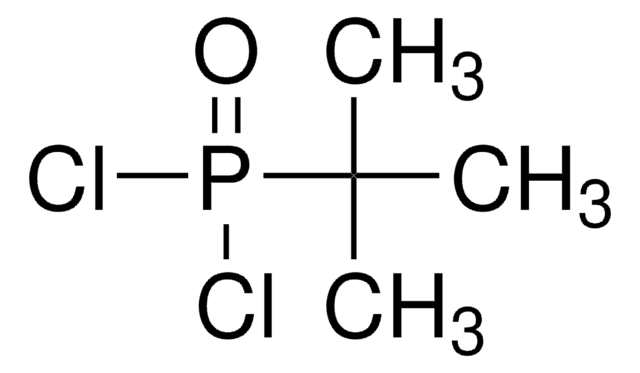305677
tert-Butylphosphonic acid
98%
Synonym(s):
P-(1,1-Dimethylethyl)phosphonic acid
Sign Into View Organizational & Contract Pricing
All Photos(2)
About This Item
Linear Formula:
(CH3)3CP(O)(OH)2
CAS Number:
Molecular Weight:
138.10
MDL number:
UNSPSC Code:
12352100
PubChem Substance ID:
NACRES:
NA.22
Recommended Products
Quality Level
Assay
98%
mp
187-189 °C (lit.)
SMILES string
CC(C)(C)P(O)(O)=O
InChI
1S/C4H11O3P/c1-4(2,3)8(5,6)7/h1-3H3,(H2,5,6,7)
InChI key
OGDSVONAYZTTDA-UHFFFAOYSA-N
Application
tert-Butylphosphonic acid was used in preparation of:
- dinuclear dicationic vanadium(IV) complexes
- borophosphonate cages
- hexanuclear copper(II) cages
- soluble molecular copper(II) phosphonates
Signal Word
Danger
Hazard Statements
Precautionary Statements
Hazard Classifications
Eye Dam. 1 - Skin Corr. 1B
Storage Class Code
8A - Combustible corrosive hazardous materials
WGK
WGK 3
Personal Protective Equipment
dust mask type N95 (US), Eyeshields, Gloves
Choose from one of the most recent versions:
Already Own This Product?
Find documentation for the products that you have recently purchased in the Document Library.
Customers Also Viewed
E Fanizza et al.
Nanoscale, 8(6), 3350-3361 (2016-01-15)
Here a luminescent hybrid nanostructure based on functionalized quantum dots (QDs) is used as a fluorescent imaging agent able to target selectively mitochondria thanks to the molecular recognition of the translocator protein (TSPO). The selective targeting of such an 18
Pius O Adelani et al.
Inorganic chemistry, 58(19), 12662-12668 (2019-09-13)
We report herein a general synthetic approach for designing uranyl coordination cages. Compounds 1 and 2 are constructed through a temperature-dependent and solvent-driven self-assembly. In both cases, the synthetic strategy involves in situ phosphonate ligand condensation into a flexible pyrophosphonate
Saskia Speed et al.
Inorganic chemistry, 51(12), 6842-6850 (2012-05-26)
The syntheses, structural characterization, and magnetic behavior of two new hexanuclear copper(II) complexes derived from R-phosphonic acids and 1,3-bis(dimethylamino)-2-propanol (Hbdmap) with formulas [Cu(6)(μ-bdmap)(3)(μ(3)-Ph-PO(3))(2)(μ(3)-O···H···μ(3)-O)(ClO(4))(2)(H(2)O)]·5H(2)O (1) and [Cu(6)(μ-bdmap)(3)(μ(3)-t-Bu-PO(3))(2)(μ(3)-O···H···μ(3)-O)(μ(1,3)-dca)(dca)(H(2)O)]·6H(2)O (2) (Ph-H(2)PO(3) = phenylphosphonic acid, t-Bu-H(2)PO(3) = tert-butylphosphonic acid, dca = dicyanamide) are reported.
Justus Tönnemann et al.
Chemistry (Weinheim an der Bergstrasse, Germany), 18(32), 9939-9945 (2012-07-06)
A versatile and experimentally facile procedure for the synthesis of borophosphonate cages of the general formula [tBuPO(3)BR'](4) is described. The method involves heating of tert-butylphosphonic acid with a boronic acid in toluene to give borophosphonates in [4+4] condensation reactions. The
Dipankar Sahoo et al.
Dalton transactions (Cambridge, England : 2003), 43(28), 10898-10909 (2014-06-06)
The reaction of vanadium(III) trichloride with tert-butylphosphonic acid (t-BuPO3H2) in the presence of 1,10-phenanthroline/2,2'-bipyridine as an ancillary ligand in acetonitrile at room temperature afforded two dinuclear dicationic vanadium(IV) complexes [(VO)2(phen)2{t-BuPO2(OH)}2(OH2)2]·2Cl [1] and [(VO)2(bipy)2{t-BuPO2(OH)}2(OH2)2]·2Cl [2]. On the other hand, when the
Our team of scientists has experience in all areas of research including Life Science, Material Science, Chemical Synthesis, Chromatography, Analytical and many others.
Contact Technical Service

















